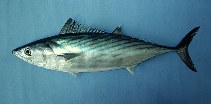Sarda chiliensis (Cuvier, 1832)
Eastern Pacific bonito
Add your observation in Fish Watcher
| Native range | All suitable habitat | Point map | Year 2050 |

|
| This map was computer-generated and has not yet been reviewed. |
| Sarda chiliensis AquaMaps Data sources: GBIF OBIS |
Upload your photos and videos
Pictures | Videos | Stamps, coins, misc. | Google imageSarda chiliensis
Picture by Béarez, P.
Pictures | Videos | Stamps, coins, misc. | Google imageSarda chiliensis
Picture by Béarez, P.
Common names from other countries
Classification / Names Common names | Synonyms | Catalog of Fishes(genus, species) | ITIS | CoL | WoRMS | Cloffa
Teleostei (teleosts) > Scombriformes (Mackerels) > Scombridae (Mackerels, tunas, bonitos) > Scombrinae
Etymology: Sarda: Latin and Greek, sarda = sardine; name related to the island of Sardinia (Ref. 45335); chiliensis: Named after Chile, South America (Ref. 6885).
More on author: Cuvier.
Etymology: Sarda: Latin and Greek, sarda = sardine; name related to the island of Sardinia (Ref. 45335); chiliensis: Named after Chile, South America (Ref. 6885).
More on author: Cuvier.
Issue
Issue on validity of subspecies: subspecies considered as valid in FB, elevated to species rank as Sarda chiliensis (Cuvier, 1832) in Eschmeyer (CofF ver. May 2011: Ref. 86870).
Environment: milieu / climate zone / depth range / distribution range Ecology
Marine; pelagic-neritic; oceanodromous (Ref. 51243); depth range 0 - 100 m. Subtropical; 60°N - 37°S, 149°W - 70°W (Ref. 168)
Distribution Countries | FAO areas | Ecosystems | Occurrences | Point map | Introductions | Faunafri
Southeast Pacific: northern Peru to Talcahuano, Chile (Ref. 9340). The northern subspecies Sarda chiliensis lineolata occurs from off the coast of Alaska, southward to Cabo San Lucas at the tip of Baja California, and in the Revillagigedo Islands.
Length at first maturity / Size / Weight / Age
Maturity: Lm 47.0 range ? - ? cm
Max length : 102 cm TL male/unsexed; (Ref. 9015); max. published weight: 11.3 kg (Ref. 168)
Max length : 102 cm TL male/unsexed; (Ref. 9015); max. published weight: 11.3 kg (Ref. 168)
Short description Identification keys | Morphology | Morphometrics
Dorsal spines (total): 17 - 19; Anal soft rays: 12 - 15; Vertebrae: 42 - 46. Mouth moderately large. Laminae of olfactory rosette 21 to 39. Interpelvic process small and bifid. Swim bladder absent. Spleen large and prominent in ventral view. Liver with elongate left and right lobes and a short middle lobe. Body completely covered with very small scales posterior to the corselet.
A coastal species that reaches sexual maturity at two years of age (Ref. 9340). Older individuals are encountered farther from the coast as compared to the juveniles (Ref. 9340). Spawning is discontinuous and a female of 3 kg may produce millions of eggs per season (Ref. 9340). Forms schools by size. Feeds on a variety of small schooling fishes, squids and shrimps. This species is important to the recreational hook and line fishery operating from private and party boats, piers and jetties, and from the shore. Also caught with encircling nets (Ref. 9340). Utilized fresh, canned and frozen; eaten broiled and baked (Ref. 9988).
Life cycle and mating behavior Maturity | Reproduction | Spawning | Eggs | Fecundity | Larvae
Main reference
Upload your references | References | Coordinator : Collette, Bruce B. | Collaborators
Collette, B.B. and C.E. Nauen, 1983. FAO Species Catalogue. Vol. 2. Scombrids of the world. An annotated and illustrated catalogue of tunas, mackerels, bonitos and related species known to date. Rome: FAO. FAO Fish. Synop. 125(2):137 p. (Ref. 168)
IUCN Red List Status (Ref. 130435: Version 2024-2)
Least Concern (LC) ; Date assessed: 15 November 2021
Threat to humans
Harmless
Human uses
Fisheries: highly commercial; gamefish: yes
FAO(Fisheries: production, species profile; publication : search) | FishSource | Sea Around Us
More information
Population dynamics
Growth parameters
Max. ages / sizes
Length-weight rel.
Length-length rel.
Length-frequencies
Mass conversion
Recruitment
Abundance
Growth parameters
Max. ages / sizes
Length-weight rel.
Length-length rel.
Length-frequencies
Mass conversion
Recruitment
Abundance
Life cycle
Reproduction
Maturity
Fecundity
Spawning
Spawning aggregations
Eggs
Egg development
Larvae
Larval dynamics
Reproduction
Maturity
Fecundity
Spawning
Spawning aggregations
Eggs
Egg development
Larvae
Larval dynamics
Anatomy
Gill area
Brain
Otolith
Gill area
Brain
Otolith
Physiology
Body composition
Nutrients
Oxygen consumption
Swimming type
Swimming speed
Visual pigments
Fish sound
Diseases & Parasites
Toxicity (LC50s)
Body composition
Nutrients
Oxygen consumption
Swimming type
Swimming speed
Visual pigments
Fish sound
Diseases & Parasites
Toxicity (LC50s)
Genetics
Genetics
Heterozygosity
Heritability
Genetics
Heterozygosity
Heritability
Tools
E-book | Field guide | Length-frequency wizard | Life-history tool | Point map | Classification Tree
| Catch-MSY |
Special reports
Download XML
Internet sources
Aquatic Commons | BHL | Cloffa | Websites from users | Check FishWatcher | CISTI | Catalog of Fishes(genus, species) | DiscoverLife | ECOTOX | Faunafri | Fishtrace | GenBank(genome, nucleotide) | GloBI | GOBASE | | Google Books | Google Scholar | Google | IGFA World Record | MitoFish | Otolith Atlas of Taiwan Fishes | PubMed | Reef Life Survey | RFE Identification | Scirus | SeaLifeBase | Tree of Life | Wikipedia(Go, Search) | World Records Freshwater Fishing | Zoological Record
Estimates based on models
Preferred temperature (Ref. 115969): 14.6 - 23.1, mean 18.5 (based on 30 cells).
Phylogenetic diversity index (Ref. 82804): PD50 = 0.5312 [Uniqueness, from 0.5 = low to 2.0 = high].
Bayesian length-weight: a=0.00955 (0.00838 - 0.01089), b=3.06 (3.02 - 3.10), in cm Total Length, based on LWR estimates for this species (Ref. 93245).
Trophic level (Ref. 69278): 4.5 ±0.3 se; based on diet studies.
Resilience (Ref. 120179): Medium, minimum population doubling time 1.4 - 4.4 years (K=0.15; tm=2).
Prior r = 0.51, 95% CL = 0.33 - 0.76, Based on 1 data-limited stock assessment.
Fishing Vulnerability (Ref. 59153): Moderate vulnerability (36 of 100).
Climate Vulnerability (Ref. 125649): High to very high vulnerability (71 of 100).




